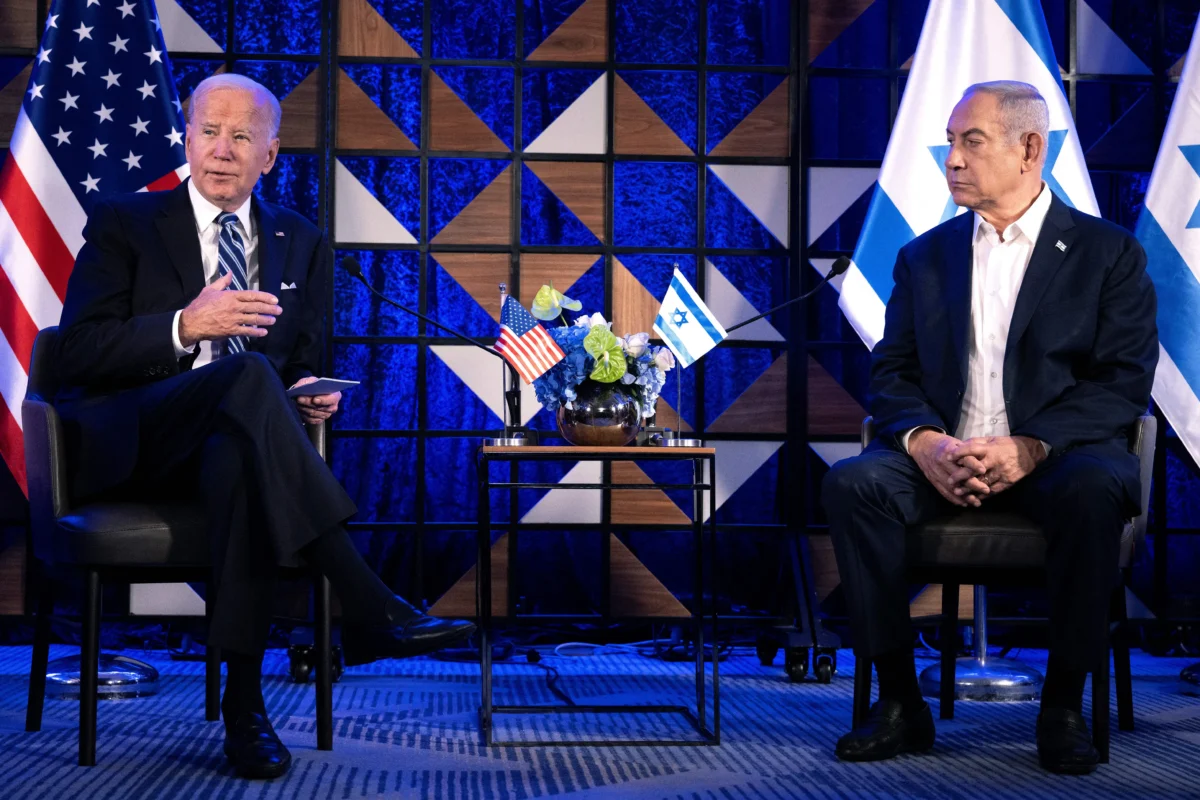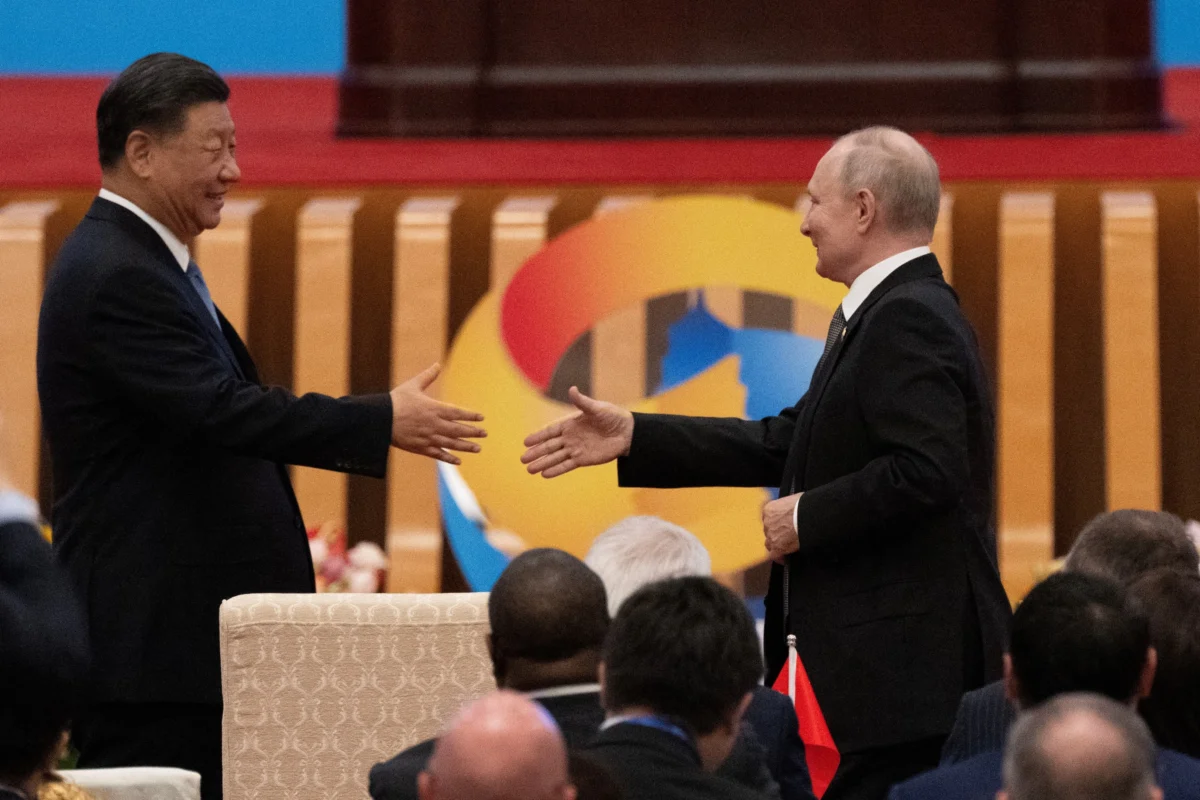Chinese leader Xi Jinping met with his Russian counterpart, Vladimir Putin, in Beijing on Oct. 18, exchanging warm greetings, referring to each other as “old” and “dear” friends, and hailing their deepening “political mutual trust.”
The Russian leader also commended Mr. Xi’s Belt and Road Initiative (BRI, also known as One Belt, One Road) for its supposed role in promoting a “fairer, multi-polar world”—a new world order.
At the end of the talks, which occurred against the backdrop of conflicts in Ukraine and the Middle East, Mr. Putin said at a press briefing that the three-hour meeting covered various issues, from the economy to political engagement.
The discussion included “the situation in the Middle East at length,” Mr. Putin told reporters in Beijing. “I informed [Xi Jinping] about the situation in Ukraine in detail.”
The Russian leader said conflicts in the world amount to “common threats,” which strengthens the ties between Moscow and Beijing.
Notably, Mr. Putin said “about an hour and a half, or maybe two hours,” was spent on “very confidential” issues. He didn’t provide future details of what they discussed but called it a “very productive and substantial” part of the meeting.
Mr. Putin ordered an invasion of Ukraine on Feb. 24, 2022, less than three weeks after he and Mr. Xi had declared a partnership with “no limits” on the opening day of the Winter Olympics in Beijing. Since then, Mr. Xi has refrained from condemning the attack and refused to characterize Moscow’s actions as an invasion.
Instead, the Chinese Communist Party (CCP) has blamed the United States for instigating the conflict, and it has expanded its trade with Russia, providing Moscow with a vital lifeline as it was hit by Western sanctions.
The trade turnover between the two neighbors has surpassed $200 billion, Mr. Putin told Mr. Xi at the start of their meeting. He said close foreign policy coordination is “especially required” due to what he called “the current difficult conditions.”
Addressing Mr. Putin as his “old friend,” Mr. Xi noted that they had met 42 times over the past decade and developed “a good working relationship and a profound friendship,” according to video clips published by China’s state media.
The two countries’ “political mutual trust” is deepening, Mr. Xi said, characterizing their strategic coordination as “close and effective.”
According to Chinese state media’s accounts of their talks, Mr. Xi reaffirmed his regime’s support to Russia in safeguarding its national sovereignty, security, and development interests. Mr. Putin, in return, backed the CCP’s territorial claims on self-ruled Taiwan.

The latest exchange between the two leaders took place in the backdrop of the Israel–Hamas war. In response to the Oct. 7 Hamas attacks—which resulted in at least 1,400 deaths and thousands injured in the Jewish state, as well as at least 199 individuals being held hostage—Israel has carried out airstrikes in Gaza.
U.S. President Joe Biden arrived in Tel Aviv on Oct. 18 to demonstrate his support for Israel.
Moscow has blamed Washington’s policies for the current war between Israel and Hamas. While Beijing condemned violence against civilians, it refrained from picking a side, saying it’s a friend to Israel and the Palestinians. On Oct. 14, China’s top diplomat, Wang Yi, called on Israel to stop its military actions, claiming it has “gone beyond self-defense” in responding to the cross-border attack by the Hamas terrorists more than a week ago.
New ‘Axis of Evil’
Earlier on Oct. 18, Mr. Xi took a veiled swipe at the United States in the opening remarks at the forum celebrating the 10th anniversary of his flagship project, the BRI.
Without mentioning any country by name, China’s leader voiced opposition to “unilateral sanctions, economic coercion, and decoupling and supply chain disruption,” referencing Washington’s efforts to counter the CCP’s unfair trade practices and intellectual property theft in recent years.

Meanwhile, Mr. Xi depicted his trillion-dollar infrastructure project as a global platform for cooperation and prosperity. Speaking after Mr. Xi, the Russian leader praised the BRI for its claimed role in creating “a fairer, multi-polar world.”
The messages given by the leaders of Russia and China aren’t surprising to outside observers.
“Putin now relies on economic assistance from China,” Su Tzu-yun, a senior analyst at Taiwan’s government-funded Institute for National Defense and Security Research, told The Epoch Times.
Moreover, the statements made by both leaders send a clear message that a new “axis of evil” has formed, according to Cheng Chin-mo, an expert in Russia and international relationships at Taiwan’s Tamkang University.
This new axis, which includes the Kremlin, the Chinese Communist Party, North Korea, and Tehran, seeks to challenge the alliance formed by Western democracies, Mr. Cheng told The Epoch Times.
“In other words, a new cold war has essentially emerged.”
‘Backbone of the New World Order’
Experts have long warned about China’s goal of a new world order.
In 2020, Nadège Rolland, a distinguished fellow at the National Bureau of Asian Research, wrote in an article that the BRI is the “backbone of the new world order that the Chinese leadership wants to see emerge.”
“Its various components are used to engrain China’s long-term influence in the developing and emerging world. This piecemeal acquisition of influence, driven by opportunism, is also guided by a strategic logic that points toward the maximization of power,” she wrote.
Ms. Rolland urged the United States to counter China in its own backyard. She said, “If kept in check in East Asia, Beijing will be less capable of expanding in other geographic areas or of establishing a wide Sinocentric sphere of influence.”
Ms. Rolland reiterated her argument in a 2021 paper.
“The BRI not only draws the notional map of China’s desired sphere of influence but also serves as a testbed for the subsystem envisioned by the Chinese leadership, in which China is at the center of a new economic and political order and exerts increasing leverage over dependent countries,” she wrote.
China and Russia began cooperating under the BRI in 2014, according to China’s state-run media.
An article featured in the 2019 report from the International Security Forum Bonn suggested that the Kremlin might view China’s BRI as a means to further its ambitions. The paper, written by Dr. Vladislav Belov, a deputy director at the Russian Academy of Science, said that BRI “could be considered an alternative approach to reformatting the world order ‘from below.’”
Mr. Belov argued that BRI “is in tune” with the Russia-dominated Eurasian Economic Union (EAEU), an alliance of former Soviet nations.
“The pairing of these projects suggests that Moscow and Beijing are building new forms of world order, more effective than similar approaches in the West,” he wrote.
Rabbi Aryeh Lightstone, former senior adviser to U.S. Ambassador to Israel David Friedman, told NTD, the sister media outlet of The Epoch Times, on Oct. 17 that the world is undergoing a reshuffling of global power dynamics.
“We’re seeing America being incredibly weak on the world stage. And we’re seeing others take advantage of it,” Mr. Lightstone said, ahead of the Putin–Xi talks. “Just three years ago, Iran was on the ropes, economically incapable of managing their own country’s affairs and certainly not meddling meaningfully in other country’s affairs.”
Now, the “evil in the world” is taking advantage of a “weak” United States, Mr. Lightstone said, adding that the atrocities committed by Hamas are something “not seen since the times of the Holocaust.”
Luo Ya contributed to this report.
From The Epoch Times

